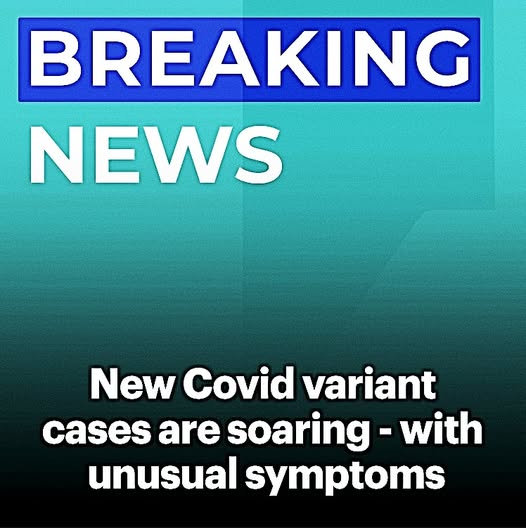Across the Atlantic, US monitoring systems are showing a similar picture. Wastewater surveillance—one of the most effective tools for tracking community spread of the virus—indicates “moderate” levels nationwide, according to the CDC. However, four states are already recording “very high” concentrations, and levels in the northeast region are continuing to rise.
Dr. Aaron Glatt, a US-based infectious disease specialist, explained that many patients describe their sore throat as an unusually severe pain. “Some say it feels as though their throat is covered with razor blades,” he said. While sore throats have always been a possible Covid symptom, this specific intensity appears more common with the new variants.
Recognizing the Symptoms
The latest variants don’t only cause sore throats. Many people continue to experience the traditional range of symptoms—headaches, coughing, nasal congestion, fatigue, and fevers. However, the standout feature of Nimbus and Stratus has been this sharp, croaky throat pain, often accompanied by voice changes.
Health experts stress that while the symptoms can be unpleasant, the variants are not causing more severe illness than earlier forms of Covid. The main concern lies in their increased transmissibility. Genetic mutations have made them more adept at spreading quickly, meaning that even if individual cases are not more severe, the overall impact on healthcare systems can still be significant.
Public Health Guidance
With infections climbing, health agencies are doubling down on vaccination campaigns. The UK’s winter vaccination drive has opened eligibility to millions of people. Over-75s, individuals with weakened immune systems, and care home residents are strongly encouraged to receive boosters. Pregnant women and children are also being invited for flu and Covid vaccines, with flu nasal sprays now available to toddlers in community pharmacies.
In the US, vaccination campaigns are underway as well, though take-up has slowed compared to earlier years. Some private pharmacies in both countries are offering Covid boosters outside of government programs, with prices ranging up to £99 ($134).
The guidance for those with symptoms remains straightforward: stay home if possible, avoid contact with vulnerable individuals, and wear a mask if you must go out. The UKHSA advises that anyone with a high temperature or who feels too unwell to work should assume they may be contagious. While free Covid testing is no longer widely available through the NHS, rapid tests can still be purchased in pharmacies.
Controversy Over Vaccine Safety
The rise in cases has coincided with renewed controversy over vaccine safety, sparked by a study published in Biomarker Research by a South Korean team. The paper claimed Covid vaccines “might raise the risk of cancer,” though it failed to provide a credible explanation of how such an effect could occur.
Experts across the globe have criticized the study as alarmist and misleading. Cancer researchers emphasize that there is no credible scientific evidence linking Covid vaccines to increased cancer risk. Tumor suppressor functions, DNA repair mechanisms, and immune surveillance have all been extensively studied in relation to vaccines, and no pathway has been identified that would support the study’s claim.
Professor Lawrence Young, a virologist at the University of Warwick, described the paper’s conclusions as “hugely overblown.” Public health officials warn that misinformation of this kind risks undermining vaccination campaigns that are critical to managing the winter surge.
The controversy echoes recent headlines involving cardiologist Dr. Aseem Malhotra, who suggested that the vaccines might be linked to cancers in prominent members of the British royal family. His claims, made at a Reform UK party conference, were swiftly dismissed by the party and discredited by scientists. The overwhelming consensus remains that Covid vaccines are safe and effective at reducing the risk of severe illness and death.
Learning to Live With Covid
Six years into the pandemic, the public has adapted to a new normal. Unlike the dark days of 2020 and 2021, widespread lockdowns are no longer on the table. Instead, governments emphasize “living with Covid,” meaning individuals are expected to take personal responsibility for reducing transmission. This includes staying home when sick, wearing masks in crowded areas, and maintaining up-to-date vaccinations.
The challenge now lies in sustaining public vigilance without causing alarm fatigue. After years of shifting rules and endless headlines, many people are tired of hearing about Covid. Yet the virus continues to evolve, and each new variant brings fresh uncertainties. Nimbus and Stratus are not catastrophic, but they are reminders that Covid has not disappeared—it remains a persistent presence in our lives.
The Bigger Picture
The return of rising case numbers highlights a larger truth: pandemics don’t end with one decisive moment. Instead, they fade into the background, occasionally roaring back with new mutations that remind us of their power. For health systems already stretched thin, even small increases in hospitalizations matter. For families, the illness may be less frightening than in 2020, but it still disrupts daily life, causes missed work, and poses risks to the most vulnerable.
What Nimbus and Stratus reveal most clearly is that Covid has entered a long-term phase, one where vigilance, adaptability, and science remain crucial. Vaccines, masks, and sensible precautions are still our most reliable tools. At the same time, misinformation—whether about vaccine safety or exaggerated claims about the variants—remains a dangerous parallel pandemic that must be addressed with facts and clear communication.
Conclusion
The new Covid variants, Nimbus and Stratus, are spreading rapidly in the UK and US, bringing with them unusual symptoms like razor-blade sore throats and increased transmissibility. While not more dangerous than their predecessors, they are significant enough to warrant attention, especially as winter places added pressure on health systems.
The message from health experts is clear: stay informed, take symptoms seriously, and use the protective measures available. Covid is no longer an overwhelming global emergency, but it is still a health risk that demands respect. The story of Nimbus and Stratus is less about panic and more about preparedness—a reminder that while the pandemic’s worst days are behind us, the virus is still part of our present and our future.

